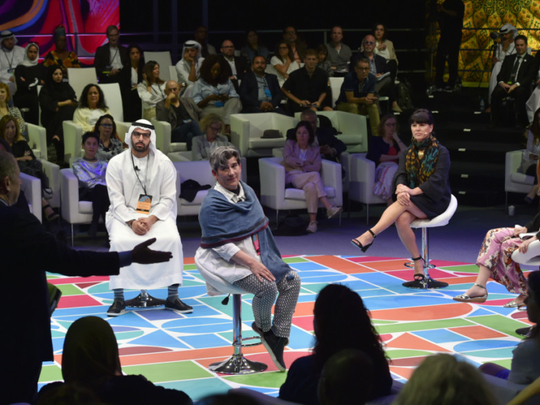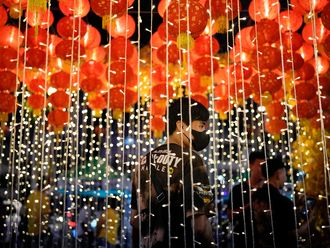
Abu Dhabi: More than 400 delegates from 80 countries attending the second edition of the CultureSummit officially on Monday in Abu Dhabi heard culture is a tangible means of bridging global divisions in society.
The first day of the summit highlighted the Louvre Abu Dhabi as an example of a culturally significant museum that has made a global impact, showing the world a different side to the region that it isn’t often associated with, and instead as a place where other cultures are not only welcomed but promoted and preserved in such museums as the Louvre.
“When we came up with the concept of creating this fantastic partnership [to open the Louvre Abu Dhabi] there was a lot of cynics as you can expect … [People asked if we] are going to be showing religious relics, is this going to open to everybody and a whole load of [other] questions,” said Mohammad Khalifa Al Mubarak, chairman, Department of Culture and Tourism — Abu Dhabi, explaining the initial scepticism that was met by the Louvre Abu Dhabi when it was first announced, as many doubted whether a country in this region would host such a museum.
“Once we opened [the Louvre Abu Dhabi] I think a lot of these cynics and critics basically took a step back and they got a stronger understanding. Today, the most visited gallery is the gallery of world religions; a gallery many people didn’t think was going to work, [they] didn’t think that people were ready to see the Jewish Torah open side by side with the Quran, [and] they didn’t expect to see a statue of the Virgin Mary with a baby Jesus side by side with an open Quran,” he added.
“Because of a lack of education they didn’t think it was going to happen. Now that they see it happening, now that they see it actually visited by more Muslims than any other gallery, I think it creates a much stronger understanding of what we’re trying to do,” he said, highlighting how the Louvre Abu Dhabi dispensed with a lot of the misconceptions people may have had about people’s religious attitudes in this part of the world.
Al Mubarak was keen to emphasise that the opening of the Louvre Abu Dhabi was not just for creating a tourist attraction, but instead, was to send a powerful message to the world by creating a universal museum.
“[The building of the Louvre Abu Dhabi] was not to create a tourist attraction … it was [about] the message that’s going to come out of Louvre Abu Dhabi, and together we have created this universal museum, a museum that I believe is a museum for all,” he said.
Meanwhile, Michael Ellis, the UK’s Minister of Arts, Heritage and Tourism, said that it was vital to promote culture in the schools, with the same equal emphasis given to other subjects such as mathematics and science.
“I think there is a tendency by many to feel that actually in order to empower young people to get jobs we need to focus on classic subjects such as mathematics and science, and there is a temptation by some to think that culture is secondary to that.
“I see it as part of my function to advocate … the case [that] culture is a crucial part of a young person’s education, it empowers young people, [and] it opens up new pathways in the brain,” he added.
Ellis also praised the UAE for hosting the CultureSummit, which he said was a strong example of culture diplomacy.
Arts help people cope during hard times
Nora Halpern, vice-president for Leadership Alliances, Americans for the Arts, spoke on the power of art to help people deal with times of hardship.
“We recently had yet another terrible tragedy in the US with guns on a high school campus … in Florida, many students were killed and many more injured, and the groups within the high school that came together was the drama club and choir.
“I do think that getting young people to understand again the power of the arts, it is what people go to in times of tragedy. If you’re stressed out you sing a song you like, and I think people don’t really understand the internal power we have when it comes to the arts to affect change.











